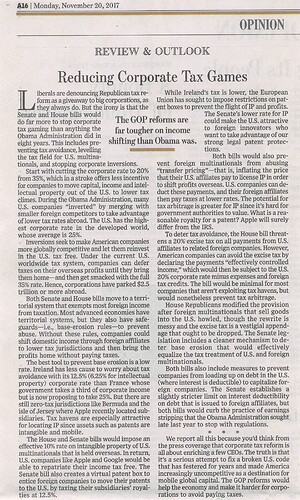Did you ever buy stocks based on Jim Cramer? I can confidently say now “NO” when you call him as “supreme leader of investors”
Here is the best editorial provided by Wall Street Journal Today. They are telling everything what happened, read word by word and sentence by sentence, this is the truth.
By The Editorial Board
Nov. 19, 2017 4:59 p.m. ET
Liberals are denouncing Republican tax reform as a giveaway to big corporations, as they always do. But the irony is that the Senate and House bills would do far more to stop corporate tax gaming than anything the Obama Administration did in eight years. This includes preventing tax avoidance, levelling the tax field for U.S. multinationals, and stopping corporate inversions.
Start with cutting the corporate rate to 20% from 35%, which in a stroke offers less incentive for companies to move capital, income and intellectual property out of the U.S. to lower tax climes. During the Obama Administration, many U.S. companies “inverted” by merging with smaller foreign competitors to take advantage of lower tax rates abroad. The U.S. has the highest corporate rate in the developed world, whose average is 25%.
Inversions seek to make American companies more globally competitive and let them reinvest in the U.S. tax free. Under the current U.S. worldwide tax system, companies can defer taxes on their overseas profits until they bring them home—and then get smacked with the full 35% rate. Hence, corporations have parked $2.5 trillion or more abroad.
Both Senate and House bills move to a territorial system that exempts most foreign income from taxation. Most advanced economies have territorial systems, but they also have safeguards—i.e., base-erosion rules—to prevent abuse. Without these rules, companies could shift domestic income through foreign affiliates to lower tax jurisdictions and then bring the profits home without paying taxes.
The best tool to prevent base erosion is a low rate. Ireland has less cause to worry about tax avoidance with its 12.5% (6.25% for intellectual property) corporate rate than France whose government takes a third of corporate income but is now proposing to take 25%. But there are still zero-tax jurisdictions like Bermuda and the isle of Jersey where Apple recently located subsidiaries. Tax havens are especially attractive for locating IP since assets such as patents are intangible and mobile.
The House and Senate bills would impose an effective 10% rate on intangible property of U.S. multinationals that is held overseas. In return, U.S. companies like Apple and Google would be able to repatriate their income tax free. The Senate bill also creates a virtual patent box to entice foreign companies to move their patents to the U.S. by taxing their subsidiaries’ royalties at 12.5%.
While Ireland’s tax is lower, the European Union has sought to impose restrictions on patent boxes to prevent the flight of IP and profits. The Senate’s lower rate for IP could make the U.S. attractive to foreign innovators who want to take advantage of our strong legal patent protections.
Both bills would also prevent foreign multinationals from abusing “transfer pricing”—that is, inflating the price that their U.S. affiliates pay to license IP in order to shift profits overseas. U.S. companies can deduct these payments, and their foreign affiliates then pay taxes at lower rates. The potential for tax arbitrage is greater for IP since it’s hard for government authorities to value. What is a reasonable royalty for a patent? Apple will surely differ from the IRS.
To deter tax avoidance, the House bill threatens a 20% excise tax on all payments from U.S. affiliates to related foreign companies. However, American companies can avoid the excise tax by declaring the payments “effectively controlled income,” which would then be subject to the U.S. 20% corporate rate minus expenses and foreign tax credits. The bill would be minimal for most companies that aren’t exploiting tax havens, but would nonetheless prevent tax arbitrage.
House Republicans modified the provision after foreign multinationals that sell goods into the U.S. howled, though the rewrite is messy and the excise tax is a vestigial appendage that ought to be dropped. The Senate legislation includes a cleaner mechanism to deter base erosion that would effectively equalize the tax treatment of U.S. and foreign multinationals.
Both bills also include measures to prevent companies from loading up on debt in the U.S. (where interest is deductible) to capitalize foreign companies. The Senate establishes a slightly stricter limit on interest deductibility on debt that is issued to foreign affiliates, but both bills would curb the practice of earnings stripping that the Obama Administration sought late last year to stop with regulations.
We report all this because you’d think from the press coverage that corporate tax reform is all about enriching a few CEOs. The truth is that it’s a serious attempt to fix a broken U.S. code that has festered for years and made America increasingly uncompetitive as a destination for mobile global capital. The GOP reforms would help the economy and make it harder for corporations to avoid paying taxes
![]() It takes really egregious wrongdoing for something more then a slap on the wrist for a fair bit of white collar fraud
It takes really egregious wrongdoing for something more then a slap on the wrist for a fair bit of white collar fraud

